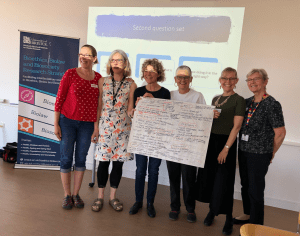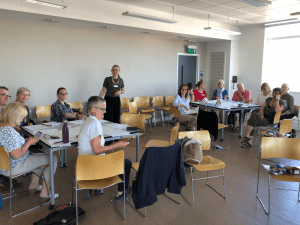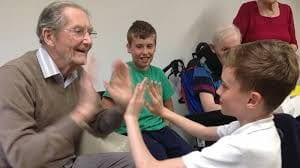Dying Matters Awareness Week (13th -19th May 2019) aims to promote conversations on dying, death and bereavement. On 14thMay 2019, a cross-disciplinary research team, which includes academics from across the University of Bristol (School of Education, School for Policy Studies and Bristol Medical School) and a lay expert in patient and public involvement, marked Dying Matters Awareness Week with an event on ‘Death Talk and Loss Talk in an Age of Longevity’. This involved a variety of facilitators of death talk and loss talk across a diverse range of settings:
- Project Eileen, a multi-media project aimed at changing attitudes towards death and grief among young people;
- Arnos Vale Cemetery, host to the inspiring annual 4-day event ‘Life, Death and the Rest’;
- Anchor Hanover, provider of specialist housing and care for people in later life in England;
- Forget Me Not Pet Crematorium, provider of professional, dignified, sympathetic Pet Cremation Service;
- Bristol Ageing Better, a partnership of individuals and organisations working together to reduce isolation and loneliness among older people in Bristol.
- Bristol Dementia Wellbeing Service, personal dementia support for Bristol people delivered by the Bristol Dementia Partnership, which brings together Alzheimer’s Society and Devon Partnership NHS Trust.
- Lyn Heathcote, who is a Funeral Celebrant & End of life Doula.
This project and event was funded by the Elizabeth Blackwell Institute’s Research Strand on Bioethics, Biolaw and Biosociety. It aims at understanding what kinds of conversations can and do take place in an ‘age of longevity’, in which a certain cultural expectation of ‘a good long life’ is matched by expectations that we will make adequate preparations over the life-course for living that good long life as independently as possible.
From left to right: Hannah Rumble (School of Education, University of Bristol); Karen West (School for Policy Studies, University of Bristol); Louise Poffley (Project Eileen); Helen Manchester (School of Education, University of Bristol); Annabelle Shaw (Project Eileen); Liz Lloyd (School for Policy Studies, University of Bristol).
The event started with the following talks: Karen West (School for Policy Studies, University of Bristol) introduced the project and highlighted recent calls from policy makers and cultural leaders for structured and facilitated conversations about death, dying and loss. In order to stimulate group discussion, Liz Lloyd (School for Policy Studies) presented some findings of people’s thoughts about death at ‘a near but uncertain time’ from her recent research on ‘Maintaining Dignity in Later Life’.
The discussions covered a wide range of topics including:
- the challenges for facilitators in starting conversations about death and dying and the use of artefacts in facilitating this;
- how we regard ourselves as dying as such when expectations of a very long life are becoming the norm;
- the different ways in which people engage with their own and others’ death and dying;
- the ways in which the death of pets can trigger conversations about human death;
- how children are often more inclined to talk about death and dying than their adult guardians and representatives; the dangers of glamorising death and dying;
- and the ways in which certain marginalised groups are excluded from participating in talking about death and dying, such as those with dementia or the homeless.
As Melanie Chalder (Bristol Medical School) noted, the conversations illustrated how – with input and guidance from people who are accustomed to talking about loss and death – some of the most challenging of subjects we face in everyday life can be handled with openness, warmth and even humour.
The discussion groups.
We were delighted that such a diverse audience wanted to participate in the discussions. We are also very pleased that the facilitators of death talk and loss talk expressed their wish to continue talking to each other about these issues. The Bristol team hopes to be engaging further with these groups and other members of the general public over the coming months as we work towards developing a research proposal to explore these questions and issues further.
Project team: Karen West, Melanie Chalder, Hannah Rumble, Helen Manchester, Kim Harman, Ailsa Cameron, Jon Symonds, Randall Smith, Liz Lloyd, Ellie Johnson, Alex Vickery, Wenjing Zhang.
If you would like to find out more information about the project or join us, please email: wenjing.zhang@bristol.ac.uk or Karen.west@bristol.ac.uk.



